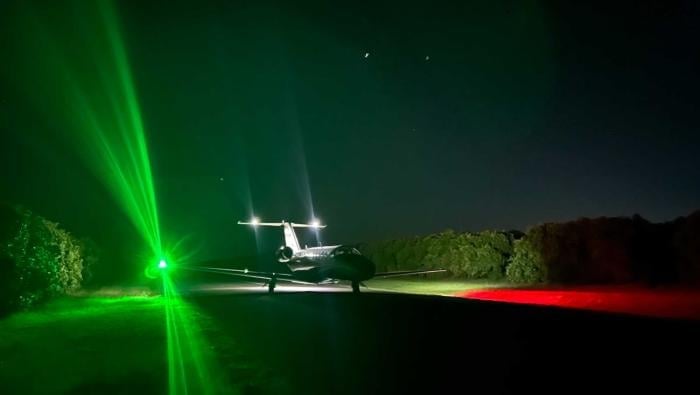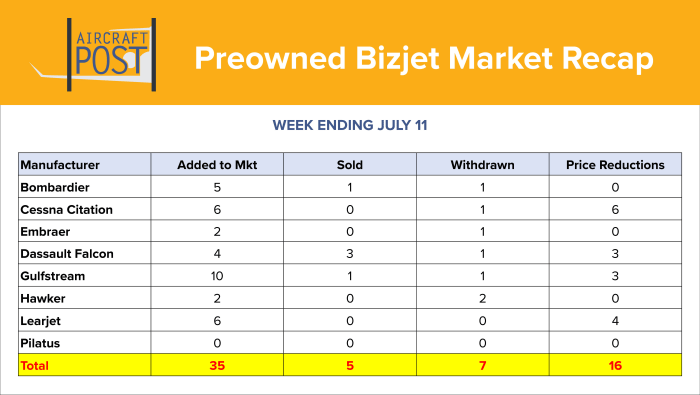
Embraer is assessing the impacts of the latest threat of tariffs, in particular to the Brazilian aviation industry, the airframer said, adding that it plans to address the topic more during its second-quarter results call on August 5. The company further said that it is continuing to work with authorities to pursue a “zero import” tax on aviation.
U.S. trade wars ratcheted up again this week with the threat of 50% tariffs on products from Brazil beginning in August—once again thrusting a key aviation market into uncertainty. Brazil has responded with plans to impose similar tariffs on U.S. products just as the country prepares to host LABACE early next month.
Analyst Jefferies looked at the potential impact of the Brazilian tariffs on Embraer, noting that 50% of its commercial aircraft backlog involves U.S. customers. For the airframer’s executive jets, the situation is a little less clear since its Phenom light jets are assembled in the U.S. and its midsize Praetors are completed there. Jefferies noted, however, that tariffs affecting the price of Praetors could have a positive impact on Textron Aviation jets.
Meanwhile, Rolland Vincent Associates, which plans to publish a research report shortly on tariffs, noted that its JetNet iQ survey revealed that nearly 60% of business jet buyers already are factoring in the potential levies in decisions on whether to delay purchases.
|
The FAA is trying to enhance the privacy around business aircraft registered in the U.S. By limiting access to information about owners of U.S.-registered aircraft, the FAA has somewhat improved privacy, safety, and security, but significant challenges remain across the ownership and transaction experience. These issues extend not only to registered owners but also to lessees and the ultimate beneficial owners (UBOs) who call the shots behind the scenes.
Consequently, with the focus on owners, UBOs need to understand and insist on protocols that optimize privacy, safety, and security involving their aircraft. Initially, UBOs should deploy measures to achieve privacy through legal ownership structuring, use of regulatory policy tools, and aircraft management.
For situations where the parties require secrecy or identify credible threats of personal injury or physical damage to the aircraft, UBOs may elect to fly on a different aircraft via a jet card, charter, club, fractional share, or other lift.
Aircraft owners understandably expect safety, privacy, and security in their use of private aviation. Although the FAA continues to make strides in protecting privacy, UBOs and the individuals in their orbit should insist on proactive measures to mitigate risks to the security, safety, and privacy of such individuals on the ground and in the air.
|
Aviation real estate developer High Flying Hangars (HFH) has won a request-for-proposal process for aircraft hangars at Nevada’s Boulder City Municipal Airport (KBVU). The Albuquerque, New Mexico-based company was selected by the city from among several applicants to develop a 40-acre parcel of land. Now, the two sides are negotiating a long-term lease agreement as plans move forward.
“The total acreage we have to work with at [KBVU] allows us to build a large number of hangars in a wide range of sizes to support the growing needs of local aircraft owners,” said HFH senior v-p of sales Lisa deFrees. She noted that designs under consideration range from 40 feet wide for piston singles up to 120 feet wide to shelter large-cabin business jets that KBVU’s 5,100-foot runway can accommodate. Also in the plan is a multi-use clubhouse for aircraft owners.
KBVU sits less than 20 miles from Las Vegas Harry Reid International Airport, and in addition to increasing hangar inventory in the market, the addition of the hangar complex is expected to spur an increase in fuel sales at Boulder City’s two FBOs.
“The Las Vegas metroplex will surely find in KBVU the land, vision, and leadership to provide the community with much-needed high-quality hangars for the owner-flown category of aircraft,” said HFH CEO Kenny Hinkes.
|
The first flights booked through charter broker Flyvbird’s AI-driven platform are set to take off in September, the company confirmed today. Flyvbird has established partnerships with a pair of undisclosed European charter operators to provide services in turboprop singles such as the Cessna Caravan, connecting Friedrichshafen in southern Germany with Mönchengladbach in the northwest of the country and to Strausberg near Berlin.
According to Flyvbird founder and CEO Tomislav Lang, the company has logged more than 8,000 “pre-launch booking requests.” The company also has commitments from more than 10 corporate customers that have said they intend to book flights for their employees for regular trips. These include a homebuilder with construction projects in Croatia and Poland.
Flyvbird is seeking to raise a further €1 million (about $1.2 million) through a seed round to support personnel, marketing, and technology development costs associated with the service launch. It has already secured €4 million in funding, including support from the German government and the EU, as well as from Switzerland’s Merse group.
Flights will be booked through the start-up’s Flyv AI app, which uses artificial intelligence to match travelers with operators with capacity to fly them, mainly between airports that are not well served by scheduled airlines. According to Lang, its AI algorithm is the key to matching supply with demand, with Flyvbird collecting the money for flights and then paying operators at previously agreed rates.
|
Republic Jet Center, an aircraft service provider at New York City-area Republic Airport (KFRG), has introduced in-house TSA screening. It noted that the offering enhances security, efficiency, and convenience for charter operators and per-seat travelers flying into and out of the metropolitan area.
The addition marks the facility as one of the few FBOs in the region to offer this level of service, which provides flexibility for DOT Part 380 operators and those offering large charter flights. Republic Jet Center president Garry Madolid told AIN that the approval process involved training and obtaining security clearance for staff members at the FBO. He said out of its 50-plus employees, approximately 20% are now qualified to conduct TSA screening.
According to the company, TSA capability complements a growing slate of services at its facility, the only independent FBO among the three service providers at KFRG. These services include onsite U.S. Customs, competitive fuel pricing, hangar space, concierge support, and customer loyalty program.
“We take pride in consistently raising the bar in private aviation while offering a full complement of services,” said Madolid. “Offering TSA screening services is a significant step forward, and it is about making private travel smarter, smoother, and more secure for our customers.”
|
Top Stories this Week on AINonline
|

Photo of the Week
Orange you glad for bizjets? Danilo Salgado, a regional sales director at Textron Aviation, snapped this nighttime photo of a Cessna Citation CJ3 in São Paulo, Brazil. He said the twinjet was returning to a customer’s orange farm “after a long day of work.” Thanks, for sharing, Danilo.
Keep them coming. If you’d like to submit an entry for Photo of the Week, email a high-resolution horizontal image (at least 2000 x 1200 pixels), along with your name, contact information, social media names, and info about it (including brief description, location, etc.) to photos@ainonline.com. Tail numbers can be removed upon request. Those submitting photos give AIN implied consent to publish them in its publications and social media channels.
|
AINalerts News Tips/Feedback:
News tips may be sent anonymously, but feedback must
include name and contact info (we will withhold name on request). We reserve the
right to edit correspondence for length, clarity, and grammar. Send feedback or
news tips to AINalerts editor Chad Trautvetter.
|
AINalerts is a publication of AIN Media Group, 214 Franklin Avenue, Midland Park, New Jersey. Copyright 2025. All rights reserved.
Reproduction in whole or in part without permission is strictly prohibited.
|
|














